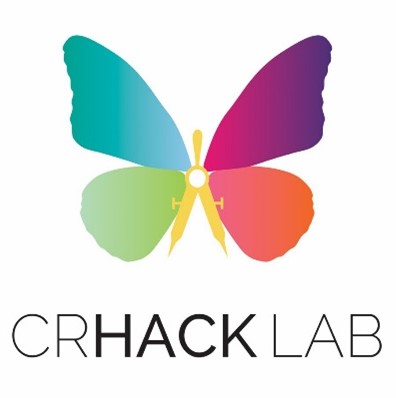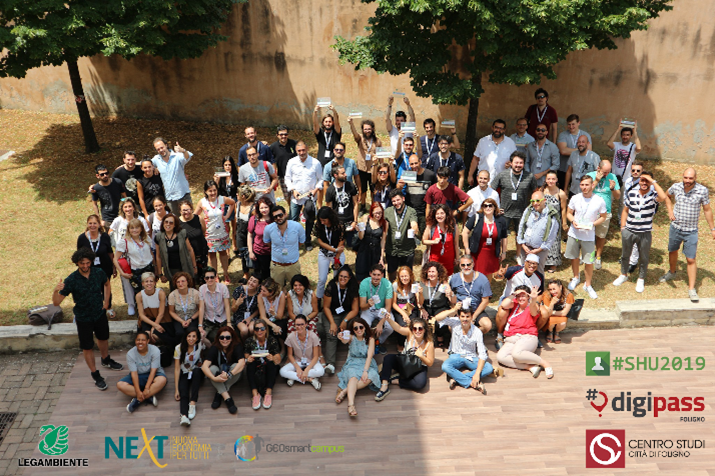Social Hackademy Labs and the disruptive social impact of grassroots initiatives for digital innovation
The first time I had the chance to experience the power of digital co-creation for social good dates back to Wednesday 6 July 2016, when after six months of intense preparation, I finally opened the doors of the Association “Study Centre City of Foligno” and welcomed the 80 participants at the first ever edition of the Social Hackathon Umbria!
Originally planned as the Italian final event of the Generation0101 project, the first edition of Social Hackathon Umbria, SHU2016, has immediately demonstrated to impact in a positive and sustainable way on all the actors involved in the co-creation process of digital solutions to societal challenges. The initiative has been carried out for the last four years involving an increasing number of participants (from 80 in 2016 to more than 180 in 2019) who have benefited from different learning activities implemented during a timeframe of 3-4 months.

In fact, the SHU training methodology provides the involvement of two main target groups:
– young learners who follow a structured training programme on one or more digital competencies to enhance their vocational profile and put in practice what they have learned contributing to the development of digital solutions that answer specific social challenges (acting as junior hackers during the final hackathon);
– representatives from public or private entities that are active at social level and have a personal or institutional interest in identifying and developing a digital solution to a social issue (acting as challenge givers and actively participating at the event).
The main strength of SHU is to base the entire process on the educational potential that a co-creation experience could offer to all the participants, regardless of their digital competence level and professional or personal profile. Therefore, based on the annual focus of each single edition of SHU, different additional groups have been invited to take part at the final event, which lasts 48 hours and represents the final phase of a quite long-term process where everyone involved has finally the feeling to have won something, regardless of the fact that they have been effectively awarded with a plate or a prize.
Over the last four years, numerous evidences of the short-term positive effects on the participating youths have been collected, such as the creation of professional and educational opportunities for NEETs who finally realized what direction to take in the future, but also refugees who had the chance to show their talents and competences in the digital field.
What has been more important for the consolidation and the growth of the initiative, though, was the offer of follow-up opportunities to the community of social hackers who took part at the event year after year. In particular, three different strategies have been adopted to support the hackers in exploiting the results achieved with the participation at the Social Hackathon.
A more traditional one consists in partnering with ideas and business incubators that offer the opportunity to follow acceleration programmes to enhance the market and/or technological readiness of the projects co-developed during the event. This is the case, for example, of the special award assigned to the Trekkify team in 2019 by NExT – New Economy for All, a national association that has developed an innovative approach to assess the social impact of start-ups and businesses against their capacity in supporting the achievement of the Sustainable Development Goals of the UN Agenda 2030.
A second strategy is to promote the hackathon as a capacity-building and networking opportunity for everyone who is interested to learn more about innovative approaches for cooperative and inclusive learning. Indeed, the experience gained with the participation at SHU2019 has allowed a lower secondary teacher from southern Italy to coordinate, on behalf of her school, the organization of a local event in occasion of the DigiEduHack, a global Hackathon promoted by the European Commission to identify key challenges for education in the digital age and co-create innovative solutions. Moreover, one of the ideas developed by the students has even being awarded as the best project among 130 innovative solutions from 21 countries.
The third one consists in the evolution of the Social Hackathon event into a permanent local Social Hackademy. A strategy that is possible only with a strong and active engagement of local stakeholders, which in Foligno (the host city of SHU) has concretized in the inauguration of a new Volunteering Youth Association called CrHack Lab Foligno 4D, supported by a multidisciplinary team of inspired mentors who share the passion in guiding young people to develop an addiction to innovative thinking and to acquire a conscious digital practical culture, which is oriented to social inclusion, exposing them in advance to the most advanced technologies to prepare them for the new jobs that will arise in the next decade.

In the Europe of the 21st century, with all its societal challenges and cultural tensions, social inclusion is progressively becoming the common answer and strategy for a smart, sustainable and, not only ‘inclusive’, but also community-based future.
Regardless the level of awareness on the concrete application of such a holistic practice, social innovation is vertically mainstreamed into the majority of European local policies’ agenda, and it has been certainly confirmed as the “red thread” linking the seven official flagship initiatives of the EU2020 strategy.
Nowadays, that we are moving towards a new programming period, which has already demonstrated of being highly unpredictable under both the social and economic point of view, the main role of a Social Hackademy is to support the implementation of innovative actions and projects with the final aim of demonstrating how digital and social innovation can mutually benefit for the realization of a “Digital Europe” founded on social value and social investments.
Indeed, if, on one hand, it is important to address the centralized policy agenda of Commission with periodical position papers, on the other hand, social innovation should not remain a cosmetic intellectual practice. Social innovation cannot exist without social subjectivity and grassroots approach.
Future jobs, local digital talent and new educational approaches are the three main pillars of the Social Hackademy Methodology proposed and promoted by the #hackAD European project, funded within the framework of the last Erasmus+ KA3 “Call for Social inclusion through education, training and youth” with the aim to scale-up the good practice already consolidated in Italy.
Author: Altheo Valentini, EGIna





No Comments